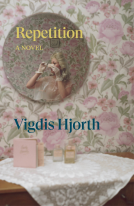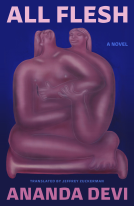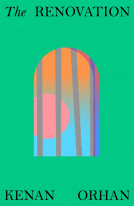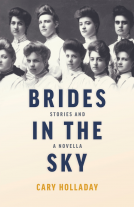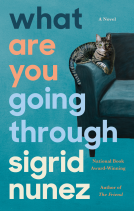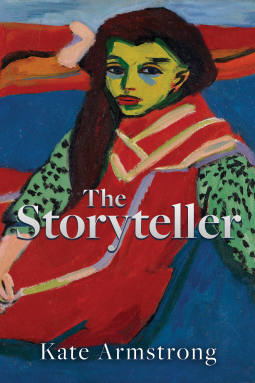
The Storyteller
by Kate Armstrong
This title was previously available on NetGalley and is now archived.
Send NetGalley books directly to your Kindle or Kindle app
1
To read on a Kindle or Kindle app, please add kindle@netgalley.com as an approved email address to receive files in your Amazon account. Click here for step-by-step instructions.
2
Also find your Kindle email address within your Amazon account, and enter it here.
Pub Date Apr 01 2017 | Archive Date Mar 30 2018
Description
A Note From the Publisher
Kate Armstrong was born in 1979 and grew up in the North of England. She studied English Literature at Oxford University, first at New College and then at Merton, where she wrote her DPhil on John Donne. She also held a lectureship at St Hugh's. Kate then followed a career in international business, writing her first novel, The Storyteller, on trains and flights and in hotel rooms. She is currently working more comfortably on her second.
Advance Praise
A strange, compelling work... A considerable achievement.' Craig Raine
“This beautiful novel is not an easy read. It is a monologue written by
an unreliable source interspersed with snapshots of a possibly fuller truth.” The Contemporary Small Press Review
Available Editions
| EDITION | Paperback |
| ISBN | 9781910688236 |
| PRICE | $13.95 (USD) |
| PAGES | 240 |
Links
Average rating from 7 members
Featured Reviews
 Danielle W, Reviewer
Danielle W, Reviewer
This is a very unique book with a horribly unreliable narrator who forces you to constantly question the reality of what is being told. The Storytellers focus is two women who's lives intersect based on their mental illness. The novel intrigues from the first page when the reader almost immediately questions the identity of the speaker, the reality of their perspective and the ultimately the purpose of their storytelling. This is not an easy read. It is sometimes dark and depressing, sometimes even boring and slow. It is well worth the read though as the writing is very sharp and the characters are unforgettable.
 Paul F, Reviewer
Paul F, Reviewer
A "The Golden Notebook" for the 21st century.
"Here is what I suggest:
That, bound together in this circle of hell, we talk fondly like sisters and we share our stories. That together we unveil what has happened in your life to bring you here, what is happening now, and what the future will be. What, and why, and what it means. That we work to create your tale.
(Your nod is tentative. But the doors are locked and you have nowhere else to go)"
Kate Armstrong's The Storyteller is a innovative and striking work from a debut novelist. It was longlisted for the wonderful Republic of Consciousness Prize for works from small independent presses that meet the criteria of ‘hardcore literary fiction and gorgeous prose’. The Storyteller certainly does that, and was, in my view, unfortunate not to make the (admittedly very strong) shortlist.
The Storyteller features two women, the older Iris Buchanan and the younger Rachel Miller. Both are in a psychiatric unit, Iris (who is, or claims to be, a romantic novelist as well as titled) a longer-standing patient, and Rachel recently arrived after a breakdown and suicide attempt.
Iris proposes to write Rachel's story - not so much how she arrived at the hospital but the story of her recovery and rehabilitation.
Rachel is initially visited in the hospital by Peter, a man she had only recently become acquainted with but on whose doorstep she collapsed after the suicide attempt, dragging him into her orbit. But when she is discharged he, reassured that she is recovering, decides to give her space, and she tries to form new relationships.
Armstrong's novel uses the unusual technique of second-person narration (Rachel's story told back to her by Iris). In the context of this story, it has two interesting effects.
Firstly, we are unclear how much of what we are reading actually happened, how much is Iris inventing what she thinks ought to have happened to Rachel, how much is her re-living her own life through the younger woman, and how much she has actively interfered in Rachel's story. E.g. this when she tells Rachel details of Peter's visits unknown to her, including how she spoke to Peter before she had even spoken to Rachel:
"What you don't know is that I know more. Yes, my dear, no need for shock. The story is not just yours to tell: we agreed to thrash out how much editorial control you have, but, for the record, there are parts which I will add. The view from the chair, my perspective, as it were. And those voices that came when he left the room, that wasn't the nurses, that was me. You take me for a fool, but I was (in advance) protecting my investment of effort and time. From outside your room I saw him emerge. "
Secondly, Armstrong very powerfully describes the process of mental unravelling and then putting the pieces back together than accompanies mental illness. The second person narration by Iris is more powerful than a third-person voice would be, but also gets around the practical problem of how a first-person narrator could comment on their own mental state (one which Doris Lessing's The Golden Notebook failed to resolve). What Rachel goes through is told to her by someone who knows, because she has been through the same thing:
"There are creepers round the windows of the gothic wing bathed in the afternoon sunshine, sheltering birds in their tendrils, holding them safe despite the promise of night. A blue tit is nodding at the window, his wings chattering as he balances, and flutters, and settles, only to fly round the corner and out of your sight. Peter sees with satisfaction the movement in your eyes, the twist in your neck as you twitch to follow the life that is darting and ducking in the breeze.
You are moving closer to taking back your part in life. From nothing you became clay-like, taking the impression of small realities around you. The weight of your limbs set up an ache in your hip; your knees scraped on the floorboards and your skin reddened in sympathy; you drank and your veins swelled to fullness. The signals have begun to return to your brain. Your responses are logical, have a prompt and a purpose, are connected to facts of life which are shared by people around you. "
The author also has her own blog which aided my understanding of the novel including her own experiences with depression but also why this is avowedly not autobiographical fiction:
"There’s one issue I’m facing again and again as I try to become whatever sort of writer is the right writer for me to be: my first book is a coming of age novel, its central character is a young woman, and depression and recovery are writ large. Told that, people assume it is autobiographical, and I assume they will assume that and so I’m embarrassed to talk about its content at all. Here’s one for the record: it’s a novel – it’s a work of fiction.
(https://katejarmstrong.wordpress.com)"
Worthwhile, a novel that deserves greater attention and an author to watch.
Dare I even say a The Golden Notebook for the 21st century.

